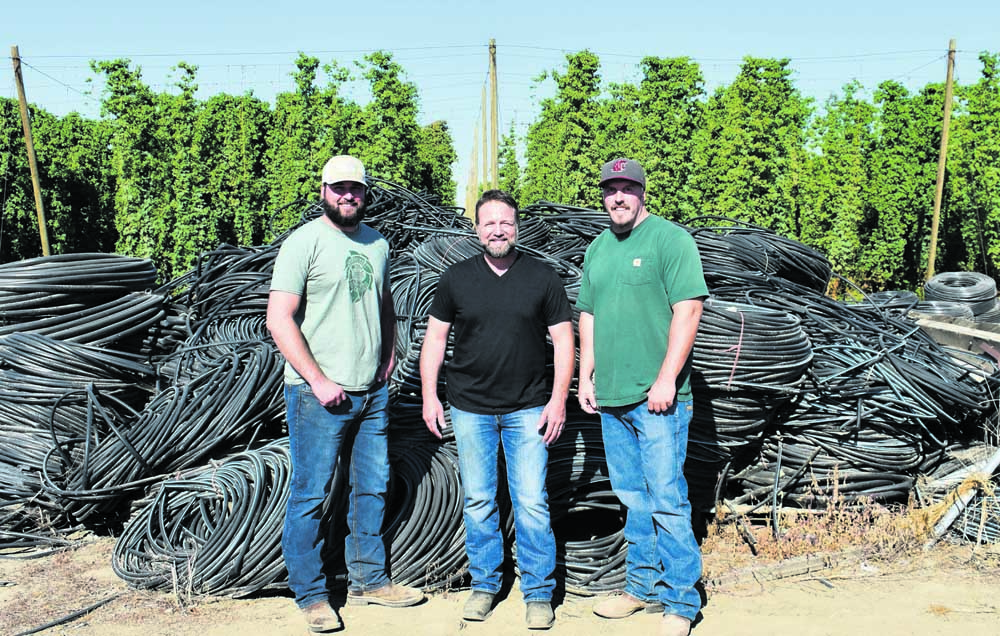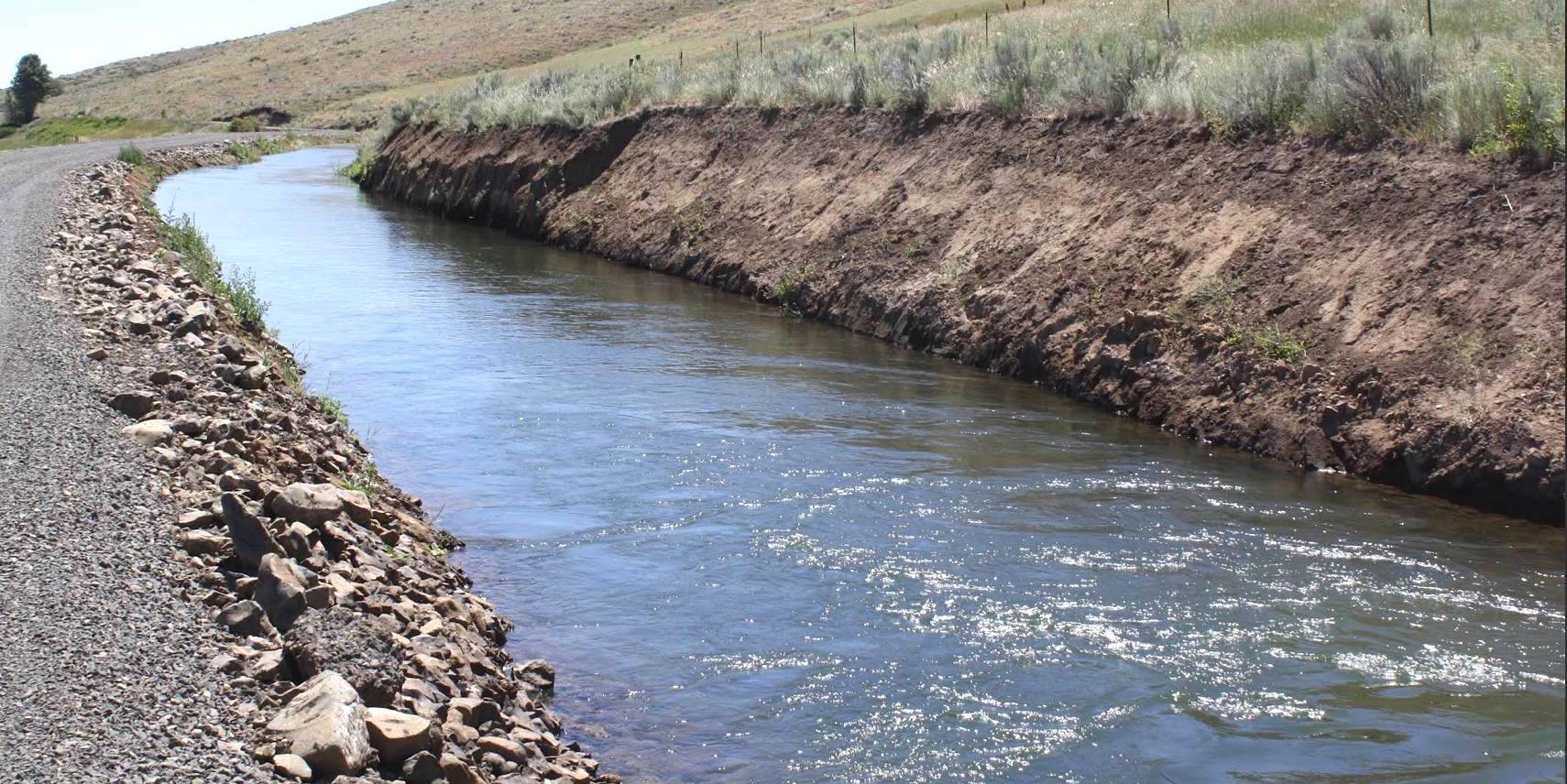New use for old irrigation tubing
Published 8:38 am Sunday, September 3, 2017

- Rotbloc owner Ken Carhart, center, stands in front of irrigation tubing flanked by Austin Carpenter, left, and Colt Carpenter of Carpenter Ranches in Granger, Wash. Carhart recycles the tubing into a product that wraps around posts to keep them from rotting.
A little more than a month ago, Bend, Ore., entrepreneur Ken Carhart drove to the Carpenter family’s hop farm in Yakima County, Wash., and hauled away discarded drip irrigation tubing.
Trending
The farm was pleased to be rid of it, and Carhart was happy to get it. Carhart will recycle the tubing into a material to wrap around wooden posts and poles to prevent them from rotting.
Carhart has been manufacturing and selling his patented product, Rotbloc, for several years. Only recently, however, did he learn that his best customers, farmers, have a surfeit of the raw material he needs.
The serendipitous discovery may give farmers an alternative to disposal fees and open a new phase in Carhart’s venture in agribusiness.
Trending
“This whole thing has been a blessing and sort of a curse,” he said.
Carhart, 46, once worked for a lumber distributor and sold wooden posts to farmers. The Environmental Protection Agency then tightened rules on wood preservatives, and options became more limited, Carhart said.
In 2013, he quit his job and drew on his experience with posts, agriculture and landscape architecture — that’s what he studied at the University of Oregon — to design Rotbloc.
He contracted with a plant in Michigan to make Rotbloc in 20-foot rolls and put them in 23 feed and grain stores.
The retailer’s approach seemed to be “throw the rolls on the shelf and see if they sell,” he said.
They didn’t. Carhart said he was close to bankrupt. He was also sick. While he was trying to get his business going, he was diagnosed with Hodgkin lymphoma. He underwent surgery and chemotherapy. Running the struggling business he started didn’t seem so bad. “It was a good distraction from my sorrows,” he said.
Around this time Rotbloc took a different tack. While Carhart was sick, his wife, Jessica, with no sales background, cold-called farmers and found customers.
“Within 30 days, we were profitable and haven’t looked back,” he said. “She is the hero.”
Craig Carpenter, whose family owns Carpenter Ranches in Granger, Wash., gave Carhart’s product a try, hoping to extend the life of trellis poles. “They would always rot right where they touched the ground,” he said.
The waterproof material wraps around the post below ground and a few inches above ground. After three years, Carpenter said he sees a difference between wrapped and unwrapped poles. “You can definitely tell it’s working,” he said.
Another customer, Yakima Golding Farms of Toppenish, Wash., hopes to extend the life of its poles by 50 to 100 percent, the farm’s manager, Mark Sechser, said.
The hop farm, owned by John I. Haas Inc., has 70 poles per acre. “There’s a lot of pole money over there,” Sechser said. “We’re pretty excited about having our poles last longer.”
Last year, the Michigan manufacturer suddenly closed without notice. Carhart obtained a loan from a nonprofit lender, Craft3 of Portland, and with the help of an engineer, Larry Braun, opened a manufacturing plant in Bend.
The plant can produce 225 pounds of product an hour, though Carhart said he hopes production can be boosted. The company gets plastic and rubber from recyclers in Washington and Oregon.
Several months ago, a farmer asked Carhart if he did anything with old irrigation tubing. Carhart said “no,” but got to thinking and researching. Carhart found out the tubing was made from the low-density polyethylene plastic he needs.
Other companies, including several in California, recycle irrigation tubing, but for other products.
Besides hops, the Carpenters grow wine grapes and other types of fruit. Craig Carpenter estimates the farm has 300 rolls of discarded irrigation tubing, each 2 feet wide by 4 feet tall. The rolls are stashed in several places. A gardener occasionally asks for a strip, but that doesn’t dent the pile.
“We were trying to figure out what to do with it,” Carpenter said. “There’s a lot of it out there, and it’s got to go somewhere. I don’t know what other places are doing, but we sure found a way out for us.”
He said he’s happy that recycling is the way out. “We try to be as green as we can.”
Since the first trip to Carpenter Ranches, Carhart has hauled away another trailer load of tubing from another farm. “I’m not sure what other outlet there is for that drip tube,” Sechser said.
Carhart said most of his Rotbloc customers are in the Northwest, but he also has shipped the product to several foreign countries. On the material, he prints instructions in four languages: English and Spanish, Italian and German. The Carharts like visiting Italy, and Germany produces hops.
“We’re preparing for success in Germany,” he said. “The sky is the limit at this point.”
Ken Carhart
Age: 46
Occupation: Owner of Rotbloc, a product that wraps around posts to prevent them from rotting
Education: Graduated from University of Oregon, studied landscape architecture
Family: He and his wife, Jessica, have five children, ages 23 to 7
Innovation: Found a use for discarded drip irrigation tubing







